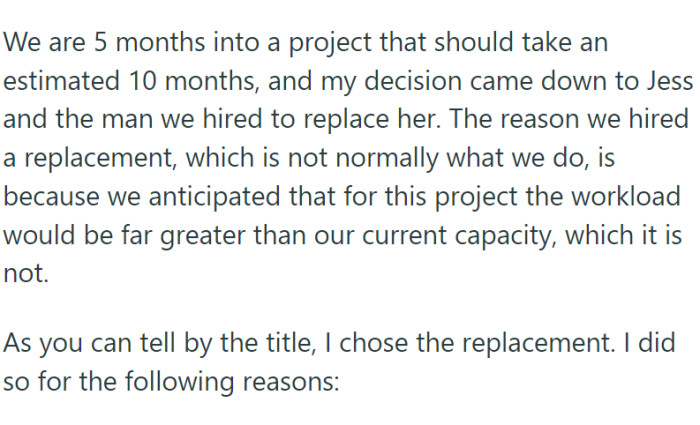
Manager Asks If Firing An Employee Returning From Maternity Leave Makes Them A Bad Manager
"I know I sound cold and heartless but I had to be fair to both employees"

The intersection of employment, fairness, and family life presents a challenging ethical landscape for managers to navigate. A recent anonymous post on Reddit revealed a dilemma faced by a team leader who felt compelled to fire an employee, Jess, upon her return from maternity leave.
The post has sparked a fierce debate about the morality of such a decision, its implications on workplace dynamics, and the fairness towards both the new and existing team members. The manager found themselves caught in an ethical quandary due to budgetary restrictions imposed by the company.
With the inability to maintain a seven-person team, the manager had to decide between retaining Jess, a recently returned mother, or a new hire who had replaced her temporarily. The manager cited several reasons for their choice.
These included the new employee's lower salary, his familiarity with ongoing projects, and the positive rapport he'd built with clients. Additional factors were Jess’s absence from the field for a prolonged period and her potential difficulty in adapting back to work.
The situation spotlights the difficult balance employers must strike between what seems best for the company and what feels fair and ethical on a personal level. On the one hand, it might appear rational to keep the employee who is more cost-effective and up-to-date with current projects.
On the other hand, firing an employee who has just returned from maternity leave raises questions about workplace discrimination and the social responsibility a company has towards its employees.
OP asks:
 Reddit
RedditOP found themselves caught in an ethical quandary due to budgetary restrictions imposed by the company
 Reddit
RedditWith the inability to maintain a seven-person team, the manager had to decide between retaining Jess, a recently returned mother, or a new hire who had replaced her temporarily.
 Reddit
RedditThe manager cited several reasons for their choice.
 Reddit
RedditTo OP, they make sense:
 Reddit
RedditHowever, that doesn't prevent them from feeling bad about it:
 Reddit
RedditRedditors were not kind on OP:
 Reddit
RedditThis Redditor has a point:
 Reddit
RedditIs OP thinking about what other women in the company would think?
 Reddit
Reddit"You're not going save money after she takes legal action"
 Reddit
RedditThis is a good question:
 Reddit
RedditThe last paragraph is so very true. Unfortunately, most people fail to see their sexism
 Reddit
RedditDoesn't look good for OP:
 Reddit
RedditThe bottom line is:
 Reddit
RedditJess's reaction—calling her manager derogatory names and refusing the offer of a recommendation letter—highlights the emotional charge of such decisions. For a new mother already facing the challenges of parenthood, losing a job can be devastating both financially and emotionally.
While the details are scant and jurisdictions may vary, firing an employee returning from maternity leave can sometimes be illegal or at least open the door to litigation. Such laws are designed to prevent discrimination against women who have recently given birth and are returning to the workplace.
While the manager may argue that the decision was made for the benefit of the team and the company, the question remains: at what cost? Their company might end up paying a lot more in legal fees.
Damjan







